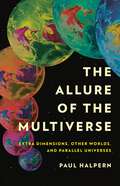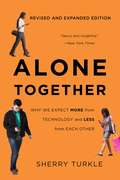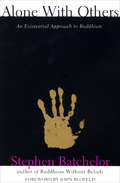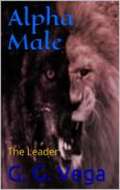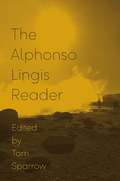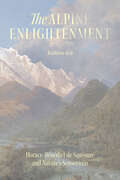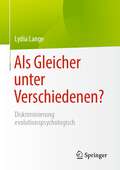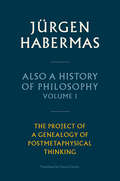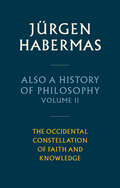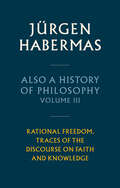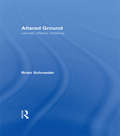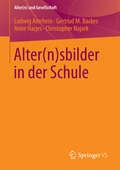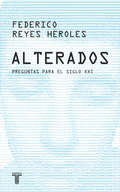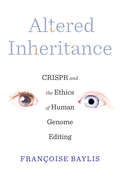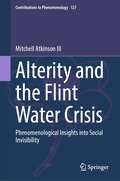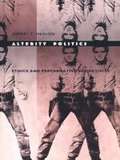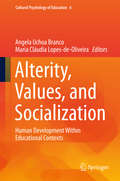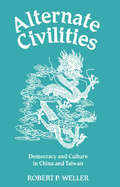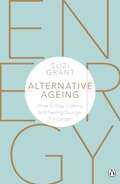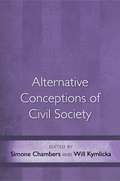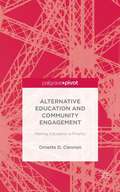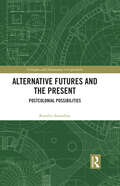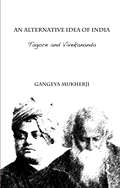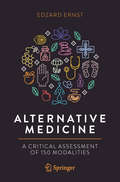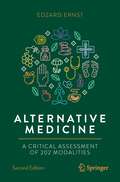- Table View
- List View
The Allure of the Multiverse: Extra Dimensions, Other Worlds, and Parallel Universes
by Paul Halpern&“A rich and rewarding history of one of the most astounding ideas in physics and astronomy&” (Marcia Bartusiak) – that the universe we know isn&’t the only one Our books, our movies—our imaginations—are obsessed with extra dimensions, alternate timelines, and the sense that all we see might not be all there is. In short, we can&’t stop thinking about the multiverse. As it turns out, physicists are similarly captivated. In The Allure of the Multiverse, physicist Paul Halpern tells the epic story of how science became besotted with the multiverse, and the controversies that ensued. The questions that brought scientists to this point are big and deep: Is reality such that anything can happen, must happen? How does quantum mechanics &“choose&” the outcomes of its apparently random processes? And why is the universe habitable? Each question quickly leads to the multiverse. Drawing on centuries of disputation and deep vision, from luminaries like Nietzsche, Einstein, and the creators of the Marvel Cinematic Universe, Halpern reveals the multiplicity of multiverses that scientists have imagined to make sense of our reality. Whether we live in one of many different possible universes, or simply the only one there is, might never be certain. But Halpern shows one thing for sure: how stimulating it can be to try to find out.
Alone Together: Why We Expect More from Technology and Less from Each Other
by Sherry TurkleConsider Facebook—it’s human contact, only easier to engage with and easier to avoid. Developing technology promises closeness. Sometimes it delivers, but much of our modern life leaves us less connected with people and more connected to simulations of them.In Alone Together, MIT technology and society professor Sherry Turkle explores the power of our new tools and toys to dramatically alter our social lives. It’s a nuanced exploration of what we are looking for—and sacrificing—in a world of electronic companions and social networking tools, and an argument that, despite the hand-waving of today’s self-described prophets of the future, it will be the next generation who will chart the path between isolation and connectivity.
Alone With Others: An Existential Approach to Buddhism
by Stephen BatchelorThe author of Buddhism Without Beliefs bridges the gap between Western and Eastern philosophy with this humanist approach to Buddhism. This uniquely contemporary guide to understanding the timeless message of Buddhism, and in particular its relevance in actual human relations, was inspired by Shantideva’s Guide to the Bodhisattva’s Way Of Life, which the author translated into English, the oral instructions of living Buddhist masters, Heidegger’s classic Being and Time, and the writings of the Christian theologians Paul Tillich and John MacQuarrie. “The text is written with unusual clarity of style, making difficult matters readily accessible . . . It fills a serious gap in the dialogue between East and West, and does so in the most sensitive, most intelligent, and most careful way . . . Batchelor’s strategy—to use the Western disciplines in order to make Buddhism accessible to the Westerner—is, I think, highly successful. The book makes a fine introduction.” —David Michael Levin, Department of Philosophy, Northwestern University “Magnificent-inspiring! . . . This excellent book has come to me personally as an illuminating text, despite my close on sixty years’ concern with Buddhism . . . [Batchelor’s] approach is likely to appeal to many categories of readers who have hitherto never considered Buddhism as having great relevance to themselves.” —John Blofeld, from the Foreword
Alpha Male
by Guido Galeano Vega Victor Hugo Susavila CampoAlpha Male, The Leader. This concept is furthermore applied, within the nature or the animal social system. In modern societies, it is also applied to define, certain types of people, which are characterized by their leadership ability.
The Alphonso Lingis Reader
by Alphonso LingisA selection of the writings of Alphonso Lingis, showcasing a unique blend of travelogue, cultural anthropology, and philosophy Alphonso Lingis is arguably the most intriguing American philosopher of the past fifty years—a scholar of transience, someone who has visited and revisited more than one hundred countries and has woven this itinerary into his writing and allowed it to give form to his thinking. This book assembles a representative selection of Lingis&’s work to give readers a thorough sense of his methodology and vision, the diversity of his subject matter, and the unity of his thought.Lingis&’s writing evinces the many kinds of knowledge and subtle forces circulating through human communities and their environments. His unique style blends travel writing, cultural anthropology, and personal accounts of his innumerable experiences as an active participant in the adventures and relationships that fill his life. Drawing from countless articles, essays, and interviews published over fifty years, editor Tom Sparrow chose works that follow Lingis&’s engaging, often intimate reflections on the body in motion and the myriad influences—social, cultural, aesthetic, libidinal, physical, mythological—that shape and animate it as it moves through the world, among people and places both foreign and domestic, familiar and unknown. In a substantial Introduction, Sparrow provides a biographical, critical, intellectual, and cultural context for reading and appreciating Alphonso Lingis&’s work.An extended encounter with the singular philosopher, The Alphonso Lingis Reader conducts us through Lingis&’s early writing on phenomenology to his hybrid studies fusing philosophy, psychoanalysis, anthropology, communication theory, aesthetics, and other disciplines, to his original, inspired arguments about everything from knowledge to laughter to death.
The Alpine Enlightenment: Horace-Bénédict de Saussure and Nature’s Sensorium (The Life of Ideas)
by Kathleen KeteA study of the experience of nature in the eighteenth century based on the life of Horace-Bénédict de Saussure (1740–99). In The Alpine Enlightenment, historian Kathleen Kete takes us into the world of the Genevan geologist, physicist, inventor, and mountaineer Horace-Bénédict de Saussure. During his prodigious climbs into the upper ranges of the Alps, Saussure focused intensely on the natural phenomena he encountered—glaciers, crevasses, changes in the weather, and shifts in the color of the sky—and he described with great precision what he saw, heard, and touched. Kete uses Saussure’s evocative writings, which emphasized above all physical engagement with the earth, to uncover not just how people during the Enlightenment thought about nature, but how they experienced it. As Kete shows, Saussure thought with and through his body: he harnessed his senses to understand the forces that shaped the world around him. In so doing, he offered a vision of nature as worthy of respect independent of human needs, anticipating present-day concerns about the environment and our shared place within it.
Als Gleicher unter Verschiedenen?: Diskriminierung evolutionspsychologisch
by Lydia LangeWarum fallen Menschen in alte, zerstörerische Verhaltensmuster zurück? Wegen schlechten Charakters oder einer schlimmen Kindheit? Wenn wir die evolutionär geformte Natur des Menschen berücksichtigen, erkennen wir Möglichkeiten zur Kooperation und zu regelhaft gestalteter Konkurrenz.Soziale Diskriminierung als Begleiterscheinung der kulturellen Evolution kann kooperatives Verhalten untergraben. Konkurrenz als unverzichtbarer Bestandteil für den Prozess der Evolution muss dem gegenüber nicht notwendig in Feindschaft und Aggression münden, sondern kann menschengemachten Regeln folgen. Dieses Buch versucht zu zeigen, Ansatzpunkte in der frühen Phylogenese zu suchen und nicht zu große Hoffnungen auf unsere neuesten kultur-evolutionären Errungenschaften (gesinnungsethische Empfehlungen, Antidiskriminierungsgesetze, Änderung sprachlicher Symbole) zu setzen. Wenn die evolutionär geformte Natur des Menschen berücksichtigt wird, erkennen wir Möglichkeiten zur Kooperation und zu regelhaft gestalteter Konkurrenz. Dies wiederum kann helfen, dass evolutionspsychologische Erkenntnisse zur Vermeidung oder Verminderung sozialer Diskriminierung beitragen können.
Also a History of Philosophy, Volume 1: The Project of a Genealogy of Postmetaphysical Thinking
by Jürgen HabermasThis is the first volume of a ground-breaking new work by Jürgen Habermas on the history of philosophy. In this major new work, Habermas sets out the ideas that inform his systematic account of the history of Western philosophy as a genealogy of postmetaphysical thinking. His account goes far beyond a vindication of the enduring relevance of philosophical reflection founded on communicative reason as a source of orientation in the modern world. He contrasts this conception with prominent diagnoses of the supposed crisis of Enlightenment reason and culture that seeks redemption in the affirmation of traditional religious authority (Schmitt), the timeless validity of Greek metaphysics (Strauss), a numinous conception of nature (Löwith), and an occurrence of being that speaks to us from beyond the mists of pre-Socratic thought (Heidegger). Habermas situates Western philosophy in relation to traditions of thought founded in the major worldviews (Judaism, Buddhism, Confucianism and Taoism) that continue to shape contemporary culture and civilization. At the same time, he lays the groundwork for his analysis in the later volumes of the constitutive role played by the discourse on faith and knowledge in the development of Western philosophy, which is the result of the unique symbiosis that Christianity entered into with Greek thought with the Christianization of the Roman Empire. Far from raising claims to exclusivity, completeness or closure, Habermas’s history of philosophy, published in English in three volumes, opens up new lines of research and reflection that will influence the humanities and social sciences for decades to come.
Also a History of Philosophy, Volume 2: The Occidental Constellation of Faith and Knowledge
by Jürgen HabermasIn this second volume of his groundbreaking new work on the history of philosophy, Jürgen Habermas traces the development of Western thought from the reception of Platonism by early Christian thought, through the revolution in medieval philosophy and theology triggered by the rediscovery of Aristotle’s works, up to the decoupling of philosophical and theological thought in nominalism and the Reformation that ushered in the postmetaphysical thinking of the modern age. In contrast to conventional histories that focus on movements and schools, Habermas takes the dialectic of faith and knowledge as a guiding thread for analysing key developments in the thought of major figures such as Augustine, Aquinas, Scotus, Ockham and Luther that constitute milestones in the genealogy of postmetaphysical thinking. A distinctive feature of Habermas’ approach is the prominence he accords practical philosophy, and in particular legal and political ideas, and the corresponding attention he pays to social, institutional and political history, especially as these bear on the relationship between church and state. As a result, the central preoccupations of Christian thought are shown to be original responses to questions raised by the Christian worldview that exploded the framework of Greek metaphysical thinking and remain crucial for the self-understanding of contemporary philosophy. Far from raising claims to exclusivity, completeness or closure, Habermas’s history of philosophy, published in English in three volumes, opens up new lines of research and reflection that will influence the humanities and social sciences for decades to come.
Also a History of Philosophy, Volume 3: Rational Freedom. Traces of the Discourse on Faith and Knowledge
by Jürgen HabermasIn the final volume of his history of philosophy, Jürgen Habermas offers a series of brilliant interpretations of the thinkers who set the agenda for contemporary philosophy. Beginning with masterful readings of Hume and Kant, he traces the genealogy of their postmetaphysical thinking through the main currents of historicism and German Idealism, and the multifarious reactions to Hegel’s influential system, culminating in nuanced readings of Marx, Kierkegaard and Peirce. Through his analysis of their work, Habermas demonstrates the interpretive fecundity of the central themes of his philosophical enterprise – his pragmatist theory of meaning, his communicative theories of subjectivity and sociality, and his discursive theory of normativity in its moral, juridical and political manifestations. In contrast to the bland compendia of thinkers and positions generally presented in surveys of the history of philosophy, Habermas’s thematically focused interpretations are destined to provoke controversy and stimulate dialogue. With this work one of the indisputably great thinkers of our time presents a powerful vindication of his conception of philosophy as an inherently discursive – and not merely analytical or speculative – enterprise.
Altared Ground: Levinas, History, Violence
by Brian SchroederOne of the most pressing concerns for contemporary society is the issue of violence and the factors that promote it. In Altared Ground: Levinas, History and Violence Brian Schroeder stages an engagement between Emmanuel Levinas, one of the leading figures in 20th century Continental philosophy, and Plato, Hegel, Heidegger, Nietzsche, Merleau-Ponty, Derrida and others in the history of ideas. Not merely an exposition of Levinas' original and complex thinking, Brian Schroeder seeks to re-read the history of Western philosophy and religion by going beyond Levinas' alternatives to traditional theories of the self in order to suggest a notion of subjectivity that is not grounded in violence.
Alter (Alter(n) und Gesellschaft)
by Ludwig Amrhein Gertrud M. Backes Anne Harjes Christopher NajorkIm Zentrum des qualitativen Forschungsprojekts steht die Frage, welche Bilder vom Alter und Altern in der Schule vorherrschen und dort vermittelt werden. Dazu wurden Lehrpläne und Schul- und Lesebücher der Primarstufe und der Sekundarstufe I inhaltsanalytisch untersucht sowie Schüler(innen) der zweiten und neunten Klasse und deren Lehrer(innen) befragt. Das Projekt gibt Hinweise darauf, welche schulischen Alter(n)sbilder und Alter(n)sdiskurse in den verschiedenen Schulformen der alten und neuen Bundesländer vermittelt werden und welche Alter(n)sbilder die Schüler(innen) und Lehrkräfte selbst haben. Auf Grundlage der gewonnenen Ergebnisse wurden die Ansätze zu einer differenzierteren Berücksichtigung von Alter(n)sbildern im Schulunterricht mit Vertreter(inne)n der schulischen Praxis diskutiert und entsprechende Anregungen erarbeitet.
Alterados
by Federico Reyes HerolesFederico Reyes Heroles invita en este ensayo a reflexionar sobre la época en la que vivimos, a través de varias discusiones filosóficas. Del autor de Ante los ojos de Desiré, Noche tibia y El abismo, Federico Reyes Heroles. Una reflexión sobre nuestra vida moderna. En la búsqueda frenética de velocidad, alteración, intensidad, que parece marcar el siglo XXI, Federico Reyes Heroles invita a reflexionar sobre nuestra vida moderna y para ello resume y ordena algunas de las discusiones filosóficas y vitales que están en curso para ayudarnos a entender y dar sentido a nuestra vida. Federico Reyes Heroles, escritor y comentarista político, es profesor de la UNAM, presidente del Consejo Rector de Transparencia Mexicana y presidente del Consejo Directivo de la Fundación Este País. Sus comentarios son ampliamente difundidos por los principales diarios del país. Colabora en Reforma y en programas de radio y televisión.
Altered Inheritance: CRISPR and the Ethics of Human Genome Editing
by Françoise BaylisWith the advent of CRISPR gene-editing technology, designer babies have become a reality. Françoise Baylis insists that scientists alone cannot decide the terms of this new era in human evolution. Members of the public, with diverse interests and perspectives, must have a role in determining our future as a species.
Alterity and the Flint Water Crisis: Phenomenological Insights into Social Invisibility (Contributions to Phenomenology #127)
by Mitchell Atkinson IIIThis text develops a novel methodology for social investigation into the Flint (Michigan, USA) water crisis by using classical Husserlian phenomenology as its point of departure. To develop a proper method in a case like this, the author uses as primary data the experiences of the affected community. The text investigates philosophically how a water crisis happens as well as the structures of power responsible. This book grounds contemporary theories of power in a phenomenology of social experience. Key to that grounding is the careful elaboration of subject positions in power structures as partially constitutive of lifeworlds (lebensumwelten) for consciousness. The applied phenomenological tools unravel the central enigma of how a community’s concerns and the dictates of power can become so disastrously estranged. This text appeals to researchers and students working not just in phenomenology and philosophy but also to those working in the field of environmental humanities and on social justice issues.
Alterity Politics: Ethics and Performative Subjectivity
by Jeffrey NealonIn conventional identity politics subjective differences are understood negatively, as gaps to be overcome, as lacks of sameness, as evidence of failed or incomplete unity. In Alterity Politics Jeffrey T. Nealon argues instead for a concrete and ethical understanding of community, one that requires response, action, and performance instead of passive resentment and unproductive mourning for a whole that cannot be attained.While discussing the work of others who have refused to thematize difference in terms of the possibility or impossibility of sameness--Levinas, Butler, Derrida, Foucault, Deleuze, Guattari, Zizek, Jameson, Heidegger, Bakhtin--Nealon argues that ethics is constituted as inexorable affirmative response to different identities, not through an inability to understand or totalize the other. Alterity Politics combines this theoretical itinerary with crucial discussions of specific and diverse sites of literary and cultural production--the work of William S. Burroughs, Amiri Baraka, Andy Warhol, Ishmael Reed, Rush Limbaugh, and Vincent Van Gogh--along with analyses of the social formation of subjects as found in identity politics, and in multicultural and whiteness studies. In the process, Nealon takes on a wide variety of issues including white male anger, the ethical questions raised by drug addiction, the nature of literary meaning, and the concept of "becoming-black."In seeking to build an ethical structure around poststructuralist discourse and to revitalize the applied use of theoretical concepts to notions of performative identity, Alterity Politics marks a decisive intervention in literary theory, cultural studies, twentieth-century philosophy, and performance studies.
Alterity, Values, and Socialization: Human Development Within Educational Contexts (Cultural Psychology of Education #6)
by Angela Uchoa Branco Maria Cláudia Lopes-de-OliveiraThis book elaborates on issues regarding alterity, values, and human development in different educational contexts, serving from young children to adolescents to adults, and it claims for the need of educational contexts to consider their responsibilities regarding the development of the sociomoral dimension of human beings. The authors, experienced theorists and researchers sharing a cultural psychological perspective, provide a fresh understanding of educational institutions, and elaborate on how initiatives aiming at promoting dialogical practices and ethical orientation within educational contexts can be productive. They provide teachers, researchers, psychologists and parents, as well as the general public, with useful knowledge in order to contribute to theoretical and practical advances concerning education and human development.
Alternate Civilities: Democracy and Culture in China and Taiwan
by Robert P. WellerSome Asian political leaders and Western academics have recently claimed that China is unlikely to produce an open political system. This claim rests on the idea that ?Confucian cultureOCO provides an alternative to Western civil values, and that China lacked the democratic traditions and even the horizontal institutions of trust that could build a civil society. An opposed school of thought is far more optimistic about democracy, because it sees market economies of the kind China has begun to foster as pushing inexorably against authoritarian political control and reproducing Western patterns of change. "Alternate Civilities" argues for a different set of political possibilities. By comparing China with TaiwanOCOs new and vibrant democracy, it shows how democracy can grow out of Chinese cultural roots and authoritarian institutions. The business organizations, religious groups, environmental movements, and womenOCOs networks it examines do not simply reproduce Western values and institutions. These cases point to the possibility of an alternate civility, neither the stubborn remnant of an ancient authoritarian culture, nor a reflex of market economics. They are instead the active creation of new solutions to the problems of modern life. "
Alternative Ageing: How To Stay Looking and Feeling Younger For Longer
by Suzi Grant'Suzi Grant knows the secrets of youth' The TimesLOOK AND FEEL YOUR BEST IN 2020 WITH ALTERNATIVE AGEING - THE NATURAL WAY TO FEEL YOUNG AGAINSuzi Grant is in her late sixties but you wouldn't know it. Still living life to the full, she knows the secrets of looking and feeling fabulous for ever. A leading blogger and researcher into ageing, Suzi has created this easy Alternative Ageing action plan to give you more energy and vitality. Inside you'll discover:- What foods to eat and avoid- How to keep your skin glowing- How to naturally boost your hormones- Easy fitness exercises- Simple stress busters- An average alternative-ageing day Follow the tips in Alternative Ageing and you'll soon discover a new you who looks and feels great and runs rings around your children - and even grandchildren.It's time to feel young all over again.
Alternative Conceptions of Civil Society (Ethikon Series in Comparative Ethics #1)
by Simone Chambers & Will KymlickaThe idea of civil society has long been central to the Western liberal-democratic tradition, where it has been seen as a crucial site for the development and pursuit of basic liberal values such as individual freedom, social pluralism, and democratic citizenship. This book considers how a host of other ethical traditions define civil society. Unlike most studies of the subject, which focus on a particular region or tradition, it considers a range of ethical traditions rarely addressed in one volume: libertarianism, critical theory, feminism, liberal egalitarianism, natural law, Christianity, Islam, Judaism, and Confucianism. It considers the extent to which these traditions agree or disagree on how to define civil society's limits and how to evaluate its benefits and harms. <P><P>A variety of distinguished advocates and interpreters of these traditions present in-depth explorations of how these various traditions think of ethical pluralism within societies, asking how a society should respond to diversity among its members. Together they produce a work rich with original insights on a wide range of subjects about which little has been written to date. An excellent starting point for a comparative ethics of civil society, this book concludes that while the concept of civil society originated in the liberal tradition, it is quickly becoming an important focus for a truly cross-cultural dialogue. In addition to the editors, the contributors are Michael Banner, Hasan Hanafi, Loren E. Lomasky, Richard Madsen, Michael A. Mosher, Michael Pakaluk, Anne Philips, Adam B. Seligman, Suzanne Last Stone, and Michael Walzer.
Alternative Education and Community Engagement: Making Education a Priority
by Ornette D. Clennon Cassie Earl Kehinde AndrewsThis book explores the ethical and philosophical issues behind the provision of market-led alternative education. The volume examines the models of Free, Studio, Supplementary and Co-operative school provisions, asking whether a market-based approach to delivering higher standards of education actually works.
Alternative Futures and the Present: Postcolonial Possibilities (Critiques and Alternatives to Capitalism)
by Ranabir SamaddarThis book explores the idea that alternatives to our present condition are available in the present, such that a search for alternatives must involve rigorous study of some of its central texts, events, and thinkers. Through engagement with selected modern thinkers, texts, and events, it imagines a different future from the position of the current postcolonial moment, indicating the possibilities that emerge from the present and which shape contemporary radical thinking. An invitation to imagine a possible future marked with alternative possibilities of conducting struggles, and living through contentions and social restructuring, it will appeal to scholars with interests in social and political theory, political philosophy, colonialism and postcolonialism, and historical materialism.
An Alternative Idea of India: Tagore and Vivekananda
by Gangeya MukherjiThis book attempts to unravel the worldview of two prominent Indians of recent Indian history — Tagore and Vivekananda. Both suggested emancipation through political struggles but without transgressing the boundaries of humanism. This is significant, as identifying an enemy was an intrinsic part of nationalistic formulations. The larger philosophy of life, for Tagore and Vivekananda, was to reach out across geographical borders.In this work, their alternative idea of India is analysed in the larger context of the many formulations of nationalism with special reference(s) to theoretical as well as literary works in European and Indian contexts. The author brings on board critiques that have emerged recently —secularist, feminist and postcolonial — and defends his subjects against them. This book is essentially an intellectual interrogation of two eminent thinkers of their time, and falls within the rubric of intellectual history.
Alternative Medicine: A Critical Assessment of 150 Modalities
by Edzard ErnstAlternative medicine (AM) is hugely popular; about 40% of the US general population have used at least one type of alternative treatment in the past year, and in Germany this figure is around 70%. The money spent on AM is considerable: the global market is expected to reach nearly US $ 200 billion by 2025, with most of these funds coming directly out of consumers’ pockets. The reasons for this popularity are complex, but misinformation is certainly a prominent factor. The media seem to have an insatiable appetite for the subject and often report uncritically on it. Misinformation about AM on the Internet (currently about 50 million websites are focused on AM) is much more the rule than the exception. Consumers are thus being bombarded with misinformation on AM, and they are ill-protected from such misinformation and therefore prone to making wrong, unwise or dangerous therapeutic decisions, endangering their health and wasting their money. This book is a reference text aimed at guiding consumers through the maze of AM. The concept of the book is straightforward. It has two main parts. The first, short section provides essential background on AM, explaining in simple terms what is (and what is not) good, reliable evidence, and addressing other relevant issues like, for instance, the placebo response, informed consent, integrative medicine, etc. The second and main part consists of 150 short chapters, topically grouped and each dedicated to one single alternative therapeutic or diagnostic method. In each of them, seven critical points are raised. These points relate to issues that are important for consumers’ decisions whether it is worth trying the method in question. Restricting the discussion to just seven points means that issues must be prioritized to those themes which are most relevant in the context of each given modality.
Alternative Medicine: A Critical Assessment of 202 Modalities (Copernicus Books)
by Edzard ErnstAlternative medicine (AM) is popular; about 40% of the US general population have used alternative treatment in the past year, and in Germany this figure is around 70%. The global market is expected to reach nearly US $ 200 billion by 2025, with most of these funds coming directly out of consumers’ pockets. Consumers are bombarded with misleading and false information on AM and therefore prone to making wrong, unwise, or dangerous therapeutic decisions, endangering their health and wasting their money. This book is a reference text aimed at guiding consumers through the maze of AM. This second edition includes over 50 additional treatments as well as updates on many others.
